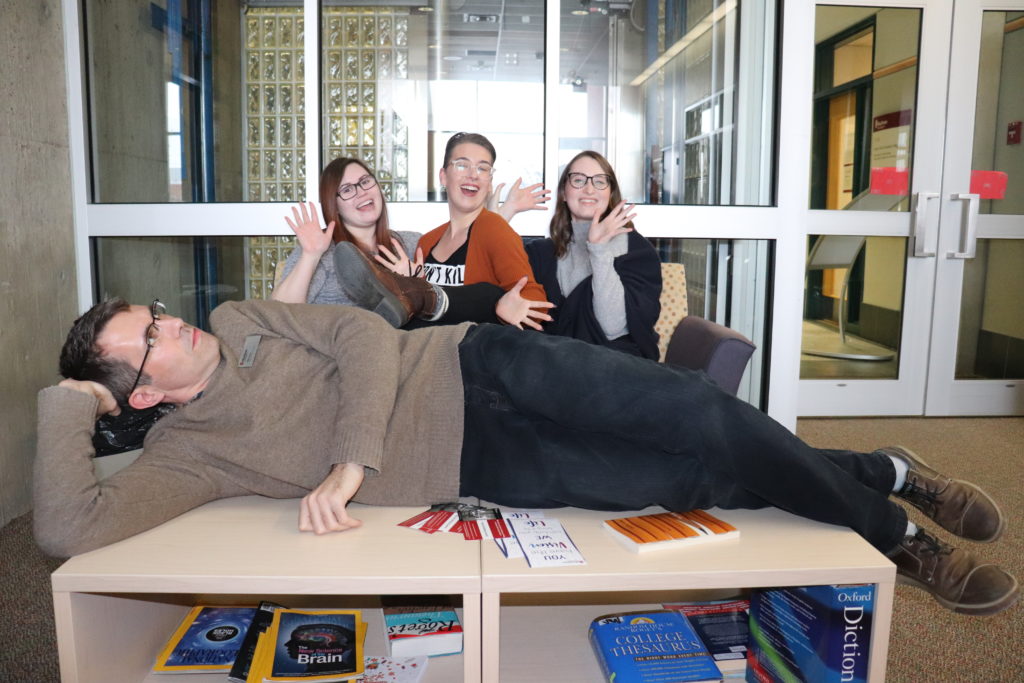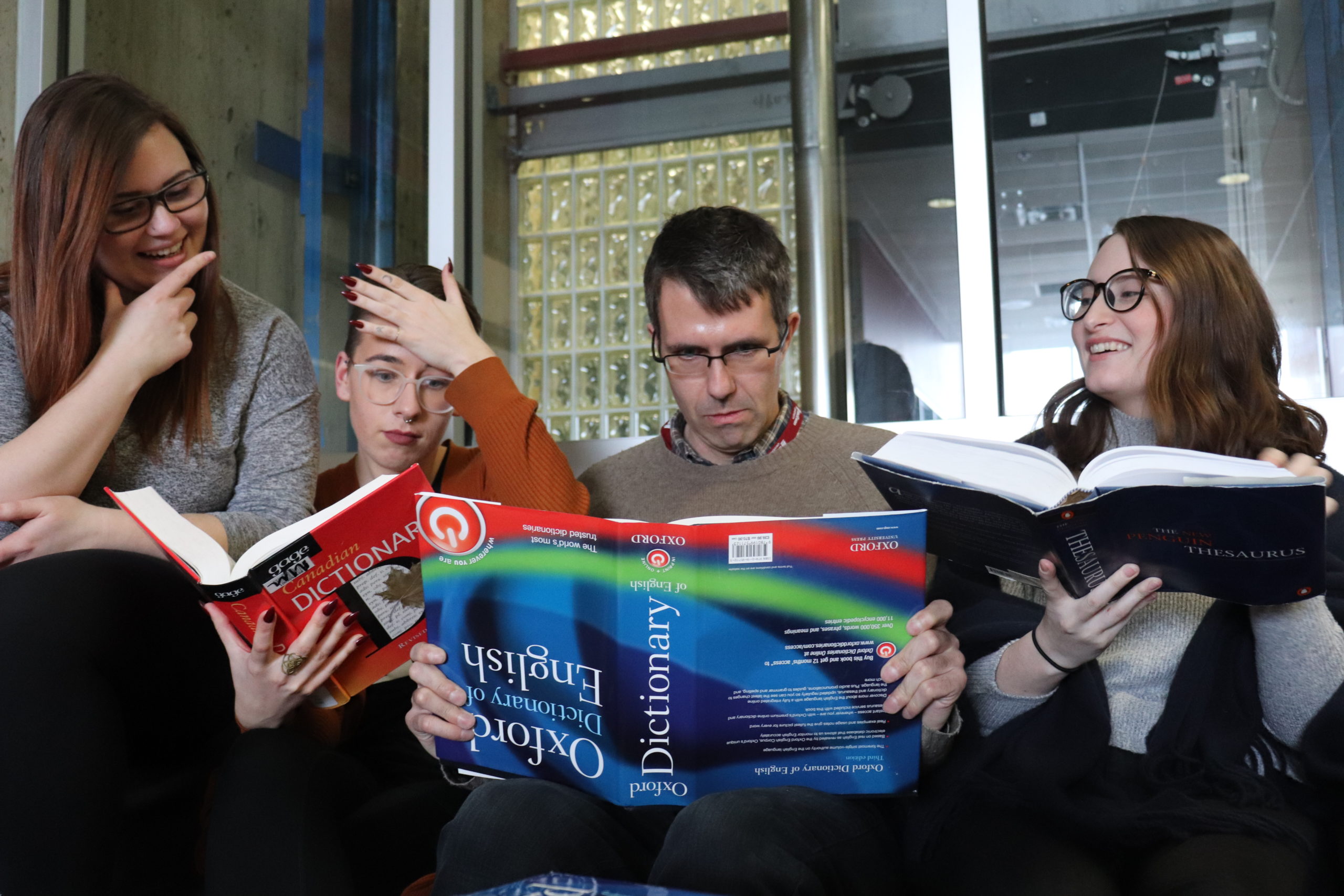When Geneve Champoux, Manager of Student Success Services, first started working at MacEwan University in 2007, the Writing Centre did not exist. There were no cozy couches on which to complete one’s homework, no long desk with computer access, no mindfulness-promoting colouring books neatly arranged on side-tables for when students just needed to take a mental break. Instead, students had to bounce between a variety of offices in order to access staff of Writing and Learning Services, and even then, this was often after a whopping six-week wait period.
For many students who needed assistance and support with their writing, the confusion of where to go and the intimidatingly long wait time was an insurmountable barrier. Those who were able to access the service gave exceptional feedback, but even then, the need for a space capable of handling the high volume of student needs was evident. And so, the Writing Centre came into being.
Instead of a series of offices where students would dash in to get feedback and then leave, the Writing Centre now is a communal space — students are still dashing in, of course, but they’re leaving with something more than feedback. There is a culture to the Writing Centre that promotes writing as a process and as a skill, rather than as a product, and just as before, it is very much in demand. Since its introduction in 2017, the Peer Tutor Program of the Writing Centre has seen a 30
This in itself is a testament to the welcoming and supportive environment of the Writing Centre, but it also speaks to an aspect of the Peer Tutor Program that is immeasurably important. When students are greeted by other students, are being guided toward support and skill development by their peers, there is no fear of assessment as there would be if meeting with a staff member or faculty. The stigma of asking for help melts away when a student can encounter someone who knows exactly what the stress of writing an annotated bibliography, or a complex thesis statement, is like. Getting assistance from a peer also means that students change their way of thinking about the Writing Centre. Instead of treating it like a vending machine where time goes in and proper citations come out, students approach the Peer Tutor Program more like a buddy system for the gym: they put in the time with their Peer Tutor on the citation treadmill, and at the end of a session not only do they have the right citations, they’ve built the skills or “muscle” required to tackle citations on their own for next time. Writing after all, is a process, not a product, and the best way to learn about writing comes about through collaboration and conversation.
Since the majority of students coming in to the Writing Centre are seeking basic help (that is, support with grammar and punctuation, paragraph structure, topic sentences, etc.), these are needs that can easily be met by the Peer Tutors. As a result, the professional staff at the Writing Centre are allowed more time to work on resource creation, such as tutorials, and are available to assist with concerns outside of the Peer Tutors’ scope. In this way, support exists for everyone. Students receive support from their Peer Tutor, and when they need it, from a member of the professional team. Peer Tutors also get support from the professional team and, based on their feedback, see this reflected in the improvement of their own writing.
The concept of the university Writing Centre began in the United States. It was inspired by the same complementary relationship that science labs have with science lectures; just as one does not learn how to be a chemist or a physician by lecture alone, one does not develop the skills to become a writer by only listening to others discuss how to write. Whether creatively or academically, one much write in order to be a writer. This is an “iterative, dynamic process” according to Champoux, and one that must be practiced in order to master. Though few students arrive at the Writing Centre believing it to be a one-stop-shop of proofreading, there remains a certain misunderstanding that the Writing Centre is a remedial space. It’s not.
Certainly many of the students who visit self-identify as needing additional support than what is available to them in the classroom, and over half of the students who visit speak English as an additional language, but the Writing Centre is nonetheless an educational space, and it is for everybody. Staff and faculty included.
“We believe in the power of everyone having some opportunity to benefit from getting feedback on their writing, especially their writing in process,” Champoux says. “And the responsibility of the Writing Centre is not just that one-on-one peer support. There’s also the responsibility for helping faculty get feedback on their assignments, or for them to ask us questions about academic integrity or writing in the various disciplines.”

Just as students benefit from the Peer Tutor Program, the Writing Centre may very well be an untapped resource for MacEwan’s faculty.
In addition to hopes for further collaboration across departments in the future, the Writing Centre has currently placed an application with the College Reading and Learning Association (the governing body for about three-quarters of the writing centres in the United States) for certification of their Peer Tutor training program. If the application is approved, this means that the Writing Centre will be able to certify the Peer Tutors after an intensive two-week training process in August, during which they will cover 13 core competencies such as tutoring ethics, communication skills, referral skills, and active listening skills. Ongoing training and support will follow this, of course, but for those students eyeing up the Peer Tutor Program as a potential position for the fall, such certification will be advantageous on a resume.
For Champoux, this bright, hopeful future for the Writing Centre is largely a product of the students who have comprised the Peer Tutor Program since day one, back in 2017.
“When I started this program, it had been years in the making, and so when it finally got to the point where it was becoming reality, there was a whole lot of fear associated with it. You never know if something you’re going to try is going to be a dismal failure. All kinds of things cross your mind and you begin to worry. But so much of where we’re going is only possible because we had such a phenomenal group of tutors for our pilot year and our second year, and it was the tutors who really made it easy. I cannot thank everyone enough who has worked here over the years for everything they have shared and done. Our foundation tutors were instrumental in making this program what it is.”
For those foundational tutors, the feeling is mutual. In addition to improving their own writing, working at the Writing Centre has given them insight into the importance of patience and empathy, as well as the satisfaction of knowing that they provide an essential service to their fellow students.
As Peer Tutor Stanley Chen puts it: “Knowing that I’ve helped students along their path to becoming better writers — in whatever small way — gives me a lot of satisfaction and joy.”
Shawn Hildebrandt adds: “The Writing Centre is important for MacEwan to have because there are gaps at the instructional level that professors will never be able to fill due to their course loads and the sheer number of students that they have. The Writing Centre is there to help fill in those gaps.”
For Mark Lyon, the Writing Centre’s very existence “shows an appreciation for how important writing is. Not to mention, it’s a great resource for students.”
And for Peer Tutor Karen Hynes, there’s a real appreciation not only for the knowledge that she gets to bestow, but that is given to her in return for her services: “The interesting thing about tutoring is that the peer tutors do not hold all of the answers — often, student and tutors work together to problem solve and work through any writing related issues that arise.”
The Writing Centre can be accessed by any MacEwan student from the main campus or Alberta College Campus (inclusive of Continuing Education students) Monday to Friday between 9 a.m. and 40 p.m. during their drop-in hours. They are located on main campus at Room 7-112.
For students away from campus, such as those who are in practicum, the Writing Centre may still be accessed through an Asynchronous Appointment. Students book a time online, submit their writing before the scheduled time, and then will receive written feedback on their piece by email.
The Writing Centre will also begin recruiting for the Peer Tutor Program in late April.





0 Comments